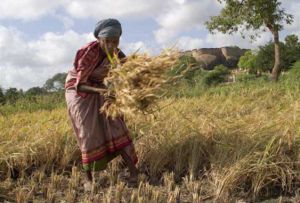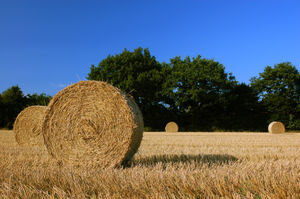Harvest
2007 Schools Wikipedia Selection. Related subjects: Food and agriculture
In agriculture, harvesting is the process of gathering mature crops from the fields. Reaping is the harvesting of grain crops. The harvest marks the end of the growing season, or the growing cycle for a particular crop. Harvesting in general usage includes the immediate post-harvest handling, all of the actions taken immediately after physically removing the crop—cooling, sorting, cleaning, packing—up to the point of further on-farm processing, or shipping to the wholesale or consumer market.
Harvest timing is a critical decision, that balances the likely weather conditions with the degree of crop maturity. Weather conditions such as frost, and unseasonably warm or cold periods, can affect yield and quality. An earlier harvest date may avoid damaging conditions, but result in poorer yield and quality. Delaying harvest may result in a better harvest, but increases the risk of weather problems. Timing of the harvest often involves a significant degree of gambling.
On smaller farms with minimal mechanization, harvesting is the most labor-intensive activity of the growing season. On large, mechanized farms, harvesting utilizes the most expensive and sophisticated farm machinery, like the combine harvester.
Harvest commonly refers to grain and produce, but is used in reference to fish and timber. The term harvest is also used within the context of irrigation where water harvesting is referred to as the collection and run-off of rainwater for agricultural or domestic uses.
Before the 16th century Harvest was the term usually used to refer to the season Autumn. However as more people gradually moved from working the land to living in towns (especially those who could read and write, the only people whose use of language we now know), the word became to refer to the actual activity of reaping, rather than the time of year, and the terms Fall and Autumn began to replace it.

